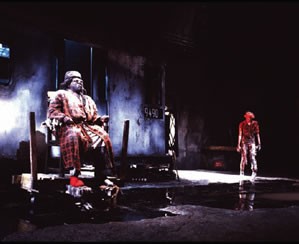Share This:
March 15, 2016 | Theatre,
Beckett Dares to Make the Metaphor Literal
Samuel Beckett was drinking in a Paris bar, when a beggar approached him and asked him for his greatcoat. Beckett gave it to him, without bothering to empty the pockets. Treacherous though it might be to conflate the artist with the art, I often look to biography for some kind of explanation of the work, or how it was made. Because Samuel Beckett’s purgatorial plays force me, at the most basic and difficult level, to question my need for a purposeful existence, I want to trust the man who wrote them. Beckett has an odd reputation though, as something of a depressive curmudgeon. So whenever I am confronted with the stereotype of Beckett the author-dictator, shutting down productions he didn’t agree with, or Silent Sam the sad hermit, I return to this story, and am comforted, like sleeping Estragon, blanketed by Vladimir’s own greatcoat in Waiting For Godot. The hope and mercy I find in his plays are somehow connected to the man.
Johnny Murphy, the great Irish actor who played the best Estragon I’ve ever seen, died a few days before I wrote this. His Gogo was a distracted Dubliner with a thousand-yard stare and a quick rapport with Barry McGovern’s irritated, desperate Didi. I saw it in a rehearsal hall in Ireland, and the entire play ran an hour and a half, and was hilariously Dublin to its core.
“This is a rock. This is a tree,” Barry said before the run-through started. It was reminiscent of the Stage Manager’s line in Our Town: “There’s some scenery, for those who think they have to have scenery.” Much of Beckett’s later work is visually striking, and short, so we’ve grown accustomed to calling it Minimalist. But who else has enough confidence in a metaphor —and in language— to restrict the physical possibilities of what is staged as much as he? We see a woman buried up to her waist, then her neck, in sand. Three heads protruding from urns, lit from a single source. One merciless mouth. If this is minimalism, any more of it would be unbearable. This is perhaps why Beckett objected so violently to “versions” of his work that cluttered or obscured the original metaphor. When Joanne Akalitis staged Endgame at the ART in 1984, she set it in an abandoned subway, ignored the stage directions, and incorporated a score by Philip Glass to accent the dramatic moments in the play. Beckett sued to shut the production down, but, supposedly relented when he heard how many people would be put out of work if the show closed. He settled for an insert in the program, which read:
“Any production of ‘Endgame’ which ignores my stage directions is completely unacceptable to me. My play requires an empty room and two small windows. The American Repertory Theater production, which dismisses my directions, is a complete parody of the play as conceived by me. Anybody who cares for the work couldn’t fail to be disgusted by this.”
Like so much of Beckett’s work, the note seems harsh at first, but on closer reading, reveals a depth of sensitivity and personal connection to the writing that belies the image of the author as a tantrum-prone control freak. “Anybody who cares for the work,” Beckett writes, and it’s not a legal argument at all. Even (especially) the word “disgusted” carries visceral, emotional associations that show us how much the imagery meant to him, more than the performance of the plays themselves. Another note to another Endgame director makes this even more explicit:
“This play can only function if performed strictly as written and in accordance with its stage instructions, nothing added and nothing removed. The director’s job is to ensure this, not to invent improvements. If and where such an approach is deemed incompatible with prevailing needs the play should be left in peace. There is no lack of others to fit the bill.”
Despite the sensitivity, or maybe because of it, Beckett’s writing is cripplingly funny. . I was lucky enough to experience an Endgame in Chicago that was performed “strictly as written” and somehow also felt immediate and hilarious.. Endgame has more than a few wheelchair jokes, and I was apprehensive and uncomfortable when two parents wheeled their disabled teenaged son into the front row. As the play went on, I instinctively checked in on the family’s reaction to the wheelchair jokes: they laughed louder, and more deeply than the rest of the audience. I’ve never witnessed a more powerful proof of a playwright’s empathy than when I watched that kid crane his head to look back at his parents, all of them sharing a laugh at the expense of their human condition.
Beckett’s miracle, for me, is his ability to strip away all meaning and still somehow convey a deep, empathetic, specific view of humanity. As he famously wrote, “When you’re up to your neck in shit, there’s nothing left to do but sing.” Beckett dares to make the metaphor literal. The danger in extrapolating meaning from his metaphors is that the metaphors themselves are the entire point of the work. Like a Cézanne still life, where the fruit draws us in so close we can see the paint itself, or the eighth note rest that begins Beethoven’s Fifth Symphony, Beckett’s desiccated landscapes and overt silences make the act of performance visible, palpable, alive, and therefore analogous to our own experiences, both in the theater and in life. We experience existence.
—
ArtsEmerson presents NOT I/FOOTFALLS/ROCKABY performed by Lisa Dwan on the mainstage of the Paramount Center MAR 16 – 20. Tickets available at artsemerson.org.





Leave a Reply